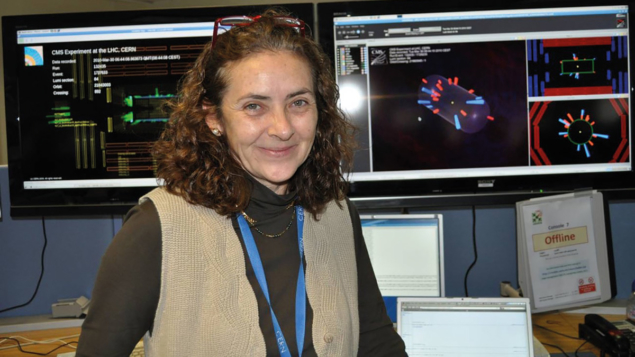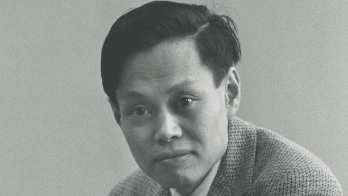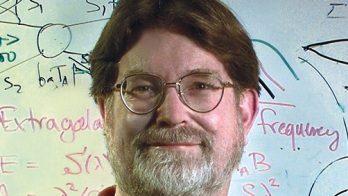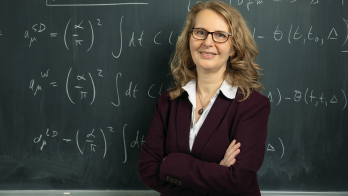
Teresa Rodrigo Anoro, professor of atomic and nuclear physics at the University of Cantabria, passed away at her home on 20 April after a long illness. She was a leading figure within the particle-physics community and played a key role in shaping Spanish particle-physics policy, with an emphasis on promoting the participation of women in science.
After her bachelor’s degree in physics from the University of Zaragoza, Teresa joined the high-energy physics group of La Junta de Energía Nuclear in Madrid (currently
CIEMAT), earning a PhD in 1985 with a thesis on the production of strange particles at the NA23 experiment at CERN. She then moved to CERN to participate in the development of the Uranium–TMP calorimeter for the upgrade of the UA1 experiment, where she started her personal journey towards finding the top quark. This eventually brought her to the CDF experiment at Fermilab, where she carried out the detailed modelling of the W+jet background, a crucial input to the top’s discovery. In 1994 she took up a faculty position at the Instituto de Física de Cantabria (IFCA) in Santander, incorporating the IFCA group into both the CDF experiment and the newly formed CMS collaboration at CERN. Under her direction, the group continued her study of the properties of the top quark and opened up a new line of research towards the discovery of the Higgs boson.
More recently, moving away from hadron beams for the first time, Teresa promoted new approaches to the search for light dark-matter at the DAMIC experiment. She was well aware of the importance of technology development and detector building in high-energy physics and orchestrated her group’s contribution to the construction of the CMS muon spectrometer, in particular its muon alignment system, and to the building of CDF’s time-of-flight detector.
Teresa’s scientific insight and strong commitment to whatever endeavour she was engaged in were recognised by the international community: she was elected chair of the CMS collaboration board (2011–2012) and served as a member of several scientific policy committees, including the European Physical Society HEPP board (2006–2013) and the CERN scientific policy committee (2012–2017). Outside academia, she was a member of several Spanish ministerial scientific panels and of the technical and research panel of the Princesa de Asturias awards. She also held an honorary doctorate from the Menéndez Pelayo International University, received the silver medal of the University of Cantabria and the first Julio Peláez award for female pioneers in science, among other recognitions.
Teresa’s influence on the Santander HEP group and the IFCA institute that she directed until a few months before her death remains very visible. During her tenure, the group grew considerably and greatly expanded its activities. The institute was awarded the greatest distinction of excellence of the Spanish science system, the Maria de Maeztu grant, and the gender-equality prize awarded by the Spanish National Research Council.
Those of us who were fortunate enough to know Teresa and to share some of her scientific passions, are aware of how kind, approachable, righteous and sympathetic
she was, though with a strong character that came from her deep honesty. Teresa’s legacy stands as a testament to her leadership, her vision and her ability to mentor rising colleagues. She will be sorely missed.







